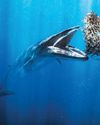
Taking place between 4 and 9 June, the Cheltenham Science Festival is one of the biggest celebrations of STEM (science, technology, engineering and maths) subjects in the UK. This year’s science trail is all about the wonders of nature and how to capture them with a camera. Scattered around the festival site are nine boards with tips on taking your very own wildlife pictures, as well as facts about the UK’s plants and animals.
All you have to do is search out the boards and find the answers to the questions on page 43. If you’re not going to the festival, you can still play along – we’ve included a round-up here. To find out more go to cheltenhamfestivals.com/science
Watch and wait
Nature photography is all about patience. You should be prepared to sit around for ages waiting to get the perfect shot. Luckily, owls also like to stay put for long periods. If they feel safe, some will happily stay in the same spot all day. Their nocturnal habits can make these birds of prey tricky to spot, but if you watch for the signs and wait for the moment, you could be rewarded with an amazing photograph
Go low
There’s lots of amazing action going on at ground level. Did you know, for example, that hedgehogs are speedy runners, careful climbers and surprisingly good swimmers. To capture dramatic photos of little animals, get on your tummy to snap your chosen subject. Being on the same level puts you into the world of small animals and gives you an insight into their lives.
Zoom in
Denne historien er fra Issue 75-utgaven av The Week Junior Science+Nature UK.
Start din 7-dagers gratis prøveperiode på Magzter GOLD for å få tilgang til tusenvis av utvalgte premiumhistorier og 9000+ magasiner og aviser.
Allerede abonnent ? Logg på
Denne historien er fra Issue 75-utgaven av The Week Junior Science+Nature UK.
Start din 7-dagers gratis prøveperiode på Magzter GOLD for å få tilgang til tusenvis av utvalgte premiumhistorier og 9000+ magasiner og aviser.
Allerede abonnent? Logg på

Camera Obscura
Imagine stepping inside a dark room, where the only source of light comes through one small hole in the wall.

MANCHESTER SCIENCE FESTIVAL
From 18-27 October, shoppers at the Arndale shopping centre in Manchester, England, will face a giant spider.

Should musicians stop touring?
Multiple concerts travelling around the world have a big impact on the environment.

Are ghosts real?
Plenty of people believe in ghosts, but it's hard to find proof.

SMASH STEREOTYPES
In an extract from his prize-winning book, scientist and writer Adam Rutherford shows you how to use the power of science to fight racism. This chapter, titled Myth-Busting, is all about sport.

Animal awareness
What would it feel like to be another animal?

Hamza Yassin
Go behind the camera with a wildlife filmmaker.

WILDLIFE WATCH
Ben Hoare goes on a safari from his sofa to discover how nature documentaries are made.

Big bum breakthrough
A team of researchers who found out that mammals can breathe through their bottoms have won a prize at the lg Nobel awards.

A jaw-dropping undersea snap
A photograph of a Bryde's whale feeding on a heart-shaped \"bait ball\" of sardines has won the Ocean Photographer of the Year contest.